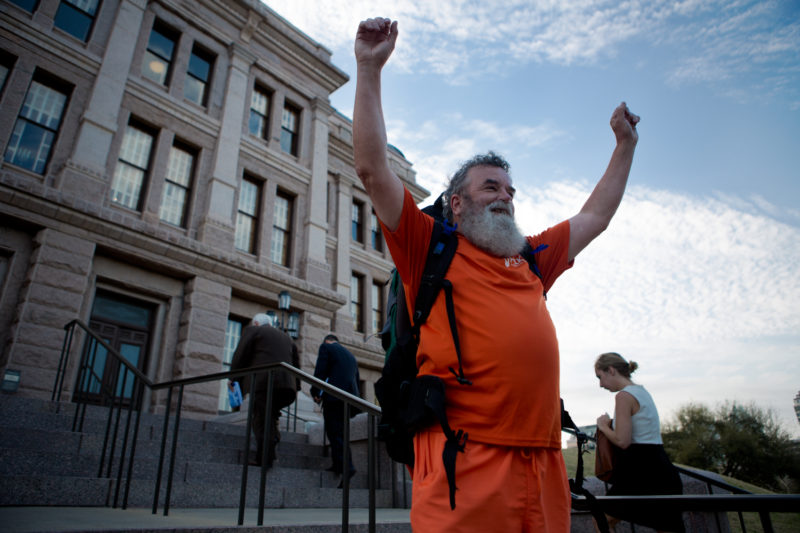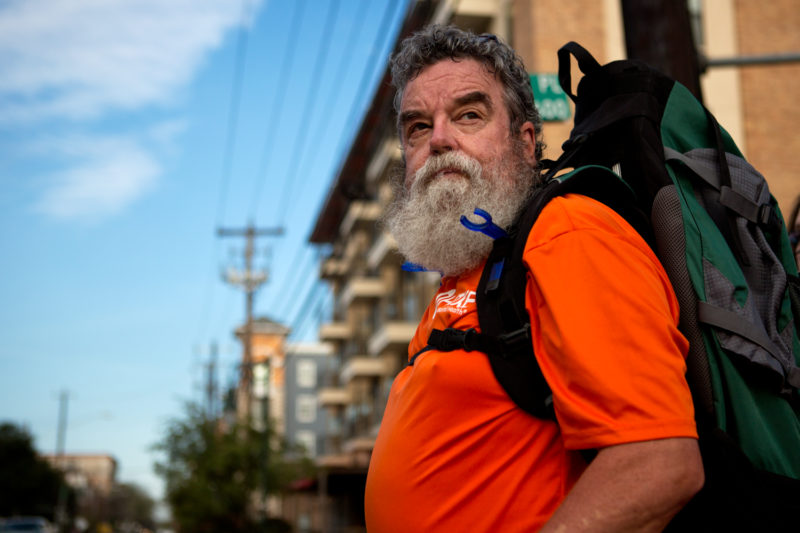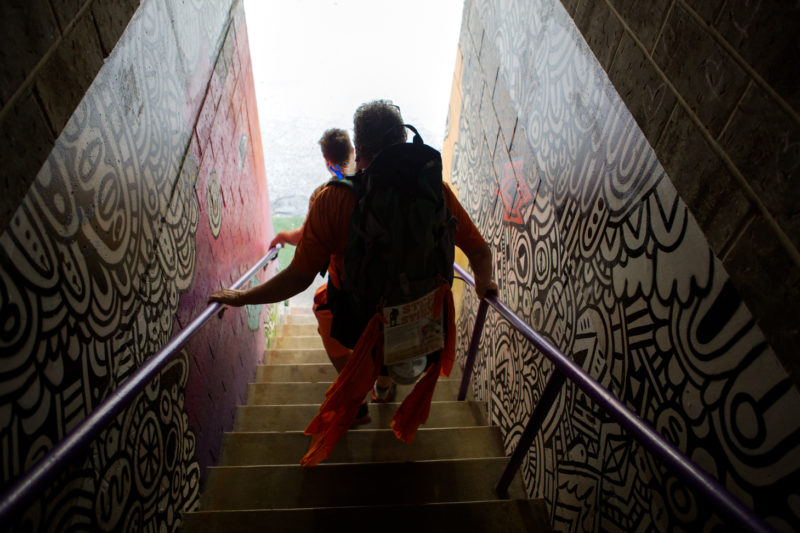Texan Hikes Hundreds of Miles to Fight Stigma of Mental Illness
By Omar Rodríguez Ortiz
Photography By Emree Weaver
Reporting Texas

Tom Kennedy, 64, celebrates a triumphant arrival to the Texas Capitol after spending three long weeks hiking from Houston to Austin. Emree Weaver/Reporting Texas
A bushy-bearded man in shorts, T-shirt and a heavy backpack entered the Texas Capitol earlier this month. He had a special delivery for the governor, the man said, and he had come a long way to deliver it.
Tom Kennedy, 64, hiked almost 300 miles from Houston to Austin—via San Antonio, no less—to hand-deliver about 700 postcards written by Texans to the office of Gov. Greg Abbott.
The effort was to raise awareness about the stigma of mental illness.
“When I was a child there was a huge stigma about breast cancer,” Kennedy said. “When a woman had breast cancer nobody talked about it. Now that stigma is gone.”
Kennedy is vice president of HIKE for Mental Health, a non-profit that organizes volunteers to hike on the Appalachian Trail and all over the United States. Each hiker raises a minimum of $100 through donations that go mostly to mental health research. A smaller percentage goes to the preservation of natural trails.
HIKE has donated more than $175,000 to the Brain & Behavior Research Foundation since its inception in December of 2011. They donated 60 percent of these funds in the last two years alone.
Kennedy moved from New Jersey to Friendswood about two years ago. He has had an awareness of the stigma of mental illness since he was a child.
“Father worked two full-time jobs,” he said. “I only saw him on the weekend. Mom did most of the raising. She suffered… I don’t know exactly what she had, but I know she self-medicated with alcohol. She had a prescription of Valium.”
HIKE’s president, Leo Walker, also had a loved one with a mental illness. His mother battled schizophrenia, but his father prohibited the family from talking about it.
“Everyone knows somebody with a mental illness, but it still falls under the radar,” said Walker, who joined Kennedy on the last 16-block stretch of the hike, from Drifter Jack’s Hostel on Guadalupe to the Texas Capitol.
The governor’s office did not respond to telephone, fax and email requests seeking comment for this story.

Kennedy says he was inspired by a friend who hiked 80 miles in New Jersey, pulling a coffin, to raise awareness of families that have lost loved ones to suicide. Emree Weaver/Reporting Texas
Serious mental health disorders afflicted an estimated 9.8 million people age 18 or older in the U.S. in 2015, according to the National Institute of Mental Health. This represented 4 percent of all U.S. adults.
A serious mental disorder results “in serious functional impairment, which substantially interferes with or limits one or more major life activities,” according to the institute’s web site.
An estimated 43.4 million adults reported a mental disorder of any kind; that represents 17.9 percent of all U.S. adults. A mental disorder is “a mental, behavioral, or emotional disorder (excluding developmental and substance use disorders).”
Texas’ record on mental health is close to the worst among the states, ranking 42nd in terms of prevalence of untreated adults with mental illness (59.7 percent), according to a 2017 report by Mental Health America. The state of Vermont has the lowest prevalence (43.1 percent), while Nevada has the highest (67.5 percent). More than 24 million mental health patients in the U.S. are left untreated. About a quarter of untreated mental health patients in Texas said that it is due to lack of affordability.
In 2017, 11 percent of Texas’ children with a mental illness lacked mental health care, which translates to 99,000 kids statewide. The U.S. total is 914,000 children.
Sometimes people’s first encounter with a mental health professional is through the emergency room, after being arrested for a crime, or after an involuntary commitment to a mental health clinic, said Rep. Four Price, chairman of the Texas House Select Committee on Mental Health.
“Even Texans that have mental health coverage on their insurance plans often don’t feel they are getting the service delivery their plans call for,” Price said.
His H.B. 10 would create an ombudsman position under the Texas Department of Insurance who would help Texans find mental health services. It would also insure that mental health co-payments wouldn’t be higher than those for physical conditions.
The bill doesn’t mandate mental health coverage to insurance companies, nor does it control the amount of copay patients must shoulder.

Tom Kennedy leaves Drifter Jack’s Hostel near the University of Texas for his hike to the Capitol. Emree Weaver/Reporting Texas
Miranda, 31, who asked that her last name not be used, was always a “difficult child” and “overly sensitive,” her mom used to say.
“She told me she didn’t know how to fix me, which made me feel like I was broken.”
In sixth grade, her best friend committed suicide due to bullying, Miranda said. Miranda’s mom decided to take her to the doctor, and she was eventually diagnosed with depression. At 22, Miranda was additionally diagnosed with bipolar II disorder, characterized by a pattern of depressive episodes and hypomanic episodes.
“If I say that I’m bipolar, people think I can be two completely different people,” said Miranda, an Austin ISD teacher. “And that is not who I am”
She talks about bipolar disorder because she wants people to learn about her condition.
“It can’t be a stigma,” Miranda said. “It’s not a choice. Nobody chooses to be mentally ill; nobody chooses to have a harder life. I’m not ashamed of myself. If anything it makes me prouder because I have to work harder to get what I want.”
As for Kennedy, he says that his most recent hike is practice for something bigger. He is considering hiking to Washington, D.C., to take the fight against stigma to Congress.
“Once the stigma is gone more people will get help,” Kennedy said.